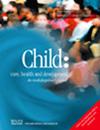The Role of Parental Physical Literacy in Family Dynamics: A Systematic Scoping Review of Existing Evidence
Abstract
Background: Physical literacy (PL) is essential for a person's engagement to physical activity (PA) for life. Previous evidence revealed that parental PL played an important role in child's outcomes related to their PA experience.
Methods: To summarize the existing evidence of parental PL and its dynamics and influence in the family system, an extensive literature search of the EBSCOhost, PubMed, Web of Science and Scopus databases was conducted to identify eligible studies.
Results: Notably, 18 studies were included in the final analysis, which were published between 2012 and 2024. Among these studies, a total of 3739 children (3–16 years old) and 2190 parents were involved. Extracted data showed that parental ethnicity and behavioural control, as well as family socio-economic status (SES) and accessible resources, were associated with parental PL. Furthermore, parental PL demonstrated a significant positive influence on child's PL and fitness level and parent–child co-PA levels. This is consistent in qualitative findings, that is, parents with middle-high SES valued children's sport participation, which could further foster their social skills and psychological capitals. Moreover, reviewed interventions exhibited a significant medium-large effect on increasing parental PL with high acceptability and feasibility.
Conclusion: Parental PL positively influences child's PL and fitness level and parent–child co-PA levels. Several existing theories may explain the dynamics and influence of parental PL in the family system. This comprehensive summary may add value for program design of health promotion in a home setting.
Summary
- In the family system, parental physical literacy (PL) plays an important role in child's perception and practice of physical activity (PA).
- This scoping review systematically summarized the existing evidence of parental PL and its dynamics and influence in the family system.
- This review supports that parental PL had a significant positive influence on child's PL and their fitness level.
- Based on this study, research gaps and health messages are identified, which may inform researchers, stakeholder and policymakers for decision-making and future program design.


 求助内容:
求助内容: 应助结果提醒方式:
应助结果提醒方式:


